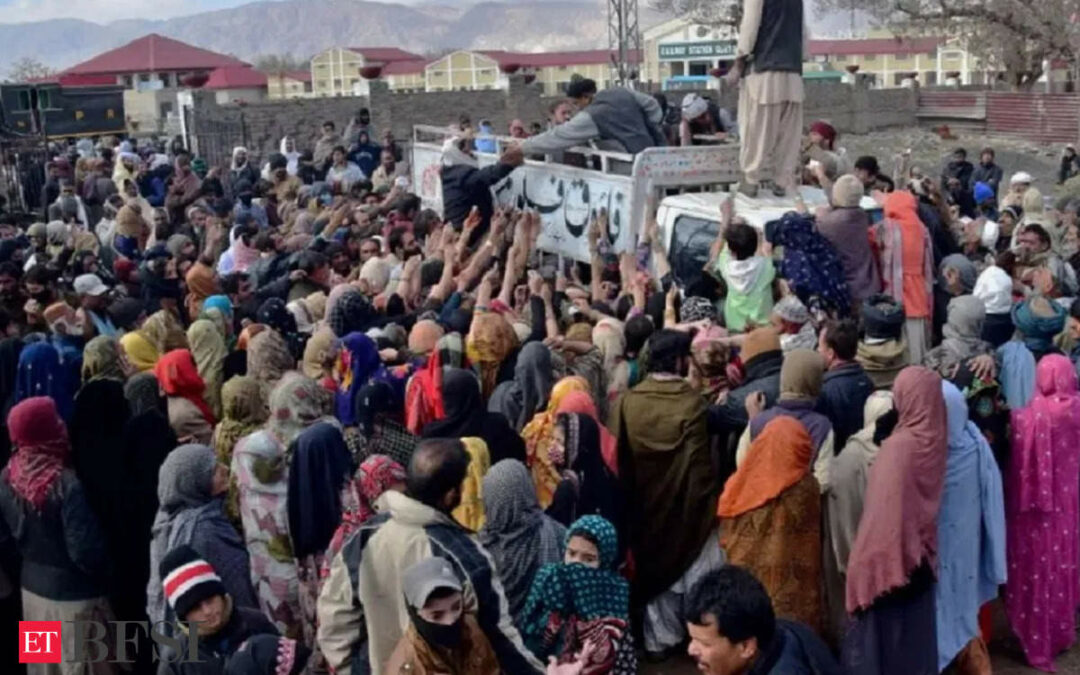NEW DELHI: Over 12.5 million Pakistanis fell below the poverty line in the past one year and now nearly 40% of the country’s population is struggling to get its basic needs met, the World Bank has said as it urged the cash-strapped country to take urgent steps to achieve financial stability.
Poverty in Pakistan rose from 34.2% to 39.4% in just one year, with 12.5 million more people falling below the poverty line of the $3.65 per day income level.
About 95 million Pakistanis now live in poverty. Pakistan also has the lowest per capita income in South Asia and highest out-of-school kids in the world.The bank said Pakistan’s average real per capita growth rate was just 1.7% between 2000 and 2020 — less than half the average per capita growth rate (4%) for South Asian countries. “While Pakistan’s per capita income was among the highest in South Asia during the 1980s, it is now among the lowest in the region.”
‘Major policy shifts required’
Tobias Haque, the World Bank’s lead country economist for Pakistan, said the nation is facing serious economic and human development crises, and is at a point where major policy shifts are required. “Pakistan’s economic model is no longer reducing poverty, and the living standards have fallen behind peer countries.”
“This may be Pakistan’s moment for significant policy shift,” said Najy Benhassine, the country director for Pakistan at the World Bank.
“Policy decisions are heavily influenced by strong vested interests, including those of military, political and business leaders,” read an overview of the ‘Reforms For a Brighter Future: Time to Decide’ that Benhassine released.
He said Pakistan had been facing numerous economic hardships including inflation, rising electricity prices, severe climate shocks, and insufficient public resources to finance development and climate adaptation — when the country was among the most vulnerable to climate change impacts.
Draft policy notes for next government
In its draft policy notes, which the World Bank prepared with the help of all stakeholders for Pakistan’s next government ahead of the new election cycle, the global lender urged Pakistan to take immediate steps to tax agriculture and real estate, and cut wasteful expenditures to stabilise the economy.
The Election Commission of Pakistan has said that the much-awaited general election in the country will take place in the last week of January next year.
Pointing out that the increase in poverty was consistent with ground realities, the World Bank identified low human development, unsustainable fiscal situation, over-regulated private sector, agriculture and energy sectors as priority areas for reforms for the next government.
‘Tax agriculture and real estate’
The World Bank suggest that Pakistan should immediately increase the tax-to-GDP ratio by 5% and cut expenditures by about 2.7% of GDP – measures aimed at putting the unsustainable economy back on a prudent fiscal path.
The Washington-based lender’s note on improving revenue-to-GDP ratio by 5% includes withdrawal of tax exemptions and increasing the burden of taxes on the real estate and the heavily subsidised agriculture sectors.
Pakistan has the capacity to collect taxes equal to 22% of the GDP, but its current ratio is only 10.2%, said the World Bank.
The lender proposed reducing distortive exemptions to generate taxes equal to 2% of the GDP. It also suggested hiking taxes on land and property to collect another 2% of GDP in revenues and generate another 1% of the GDP from the agriculture sector.
Other suggestions
The World Bank proposed a mandatory use of CNIC (Computerised National Identity Card) for transactions, particularly of assets.
It also proposed reducing energy and commodity subsidies, implementing a single treasury account, and imposing temporary austerity measures in the short term to save about 1% of the GDP equivalent expenditures.
For the medium term, it proposed reducing federal development and current expenditures on provincial nature projects, reducing spending on loss-making entities, and improving the quality of development spending to save about PKR 1.4 trillion.
The cumulative impact of these short- to medium-term savings is 2.7% of the GDP, the Washington-based lender said.
It said that another PKR 70 billion can be saved by devolving the Higher Education Commission to the provinces, and PKR 217 billion savings can be ensured through cost sharing of BISP (Benazir Income Support Programme) with the provinces.
Pakistan’s inflation soared to 27.4% in August after the cash-strapped country received $1.2 billion from the International Monetary Fund in July, a part of the $3 billion bailout programme to support the government’s efforts to stabilise the country’s ailing economy.
Pakistan’s economy has been in a free-fall mode for the last many years, bringing untold pressure on the poor masses in the form of unchecked inflation.
Despite all its economic ills, Pakistan continues to expand its nuclear arsenal.
(With inputs from agencies)










